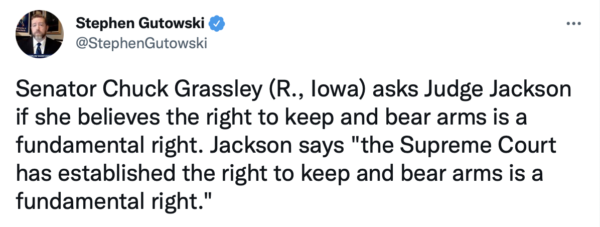The confirmation hearings for Judge Ketanji Brown Jackson are off to a predictable start, with Sen. Ted Cruz mentioning the forgotten late 18th-century Justice Bushrod Washington, who was confirmed to the Supreme Court in 24 hours, provoking a spasm from the left, which may have been Cruz’s intent.
Gillian Brockwell, a staff writer for the Washington Post‘s “history blog,” found this all too much to take:
Does Brockwell mean that Bushrod Washington (a nephew of George Washington) owned slaves? Why the sudden shift in terms to “enslaver” in the headline and throughout the article, as “enslaver” implies someone involved in the core of the slave trade, i.e., sailing to Africa to capture or purchase slaves, or rounding up fugitive slaves in the U.S.? Is being an “enslaver” thought to be a more potent attack than merely “slave-owner”?
Whatever. I rather like Cruz’s reference to Bushrod Washington for a different reason, namely, that he’s one of the few Supreme Court justices who understood the connection between natural rights and the “privileges and immunities” clause, which was amplified in the 14th Amendment, but gutted for all time by the Supreme Court in the Slaughterhouse Cases of 1873.
Here’s what he wrote in the 1823 case of Corfield v. Coryell:
The inquiry is, what are the privileges and immunities of citizens in the several states? We feel no hesitation in confining these expressions to those privileges and immunities which are, in their nature, fundamental; which belong, of right, to the citizens of all free governments; and which have, at all times, been enjoyed by the citizens of the several states which compose this Union, from the time of their becoming free, independent, and sovereign. What these fundamental principles are, it would perhaps be more tedious than difficult to enumerate. They may, however, be all comprehended under the following general heads: Protection by the government; the enjoyment of life and liberty, with the right to acquire and possess property of every kind, and to pursue and obtain happiness and safety; subject nevertheless to such restraints as the government may justly prescribe for the general good of the whole.
The right of a citizen of one state to pass through, or to reside in any other state, for purposes of trade, agriculture, professional pursuits, or otherwise; to claim the benefit of the writ of habeas corpus; to institute and maintain actions of any kind in the courts of the state; to take, hold and dispose of property, either real or personal; and an exemption from higher taxes or impositions than are paid by the other citizens of the state; may be mentioned as some of the particular privileges and immunities of citizens, which are clearly embraced by the general description of privileges deemed to be fundamental: to which may be added, the elective franchise, as regulated and established by the laws or constitution of the state in which it is to be exercised. These, and many others which might be mentioned, are, strictly speaking, privileges and immunities, and the enjoyment of them by the citizens of each state, in every other state, was manifestly calculated (to use the expressions of the preamble of the corresponding provision in the old articles of confederation) “the better to secure and perpetuate mutual friendship and intercourse among the people of the different states of the Union.”
Of course, a modern jurisprudence that protected the privileges and immunities of the citizens with vigor would involve curtailing government regulatory power. No wonder leftists want us to avert our gaze from Bushrod Washington. Maybe Cruz will follow up by asking Judge Jackson about the substance of the matter.
UPDATE: Supreme Court nominees typically bob and weave under questioning, but this answer to a question this morning hints that Judge Jackson has no special respect for either the text of the Bill of Rights, or the principles of natural rights:

In other words, what the Supreme Court createth, the Supreme Court can taketh away.
Notice: All comments are subject to moderation. Our comments are intended to be a forum for civil discourse bearing on the subject under discussion. Commenters who stray beyond the bounds of civility or employ what we deem gratuitous vulgarity in a comment — including, but not limited to, “s***,” “f***,” “a*******,” or one of their many variants — will be banned without further notice in the sole discretion of the site moderator.